
Psychotherapists help Yazidis heal layers of trauma in Iraq
Rawnaq Abdulrahman peeks out of the door of her counselling room and invites Ahmad in. The slim 37-year-old settles across from the psychotherapist, his leather jacket melting into the comfortable leather armchair. A lamp floods the room in a warm glow. Photographs of waterfalls and forests on the walls and a colourful rug on the floor transport him to a place far from the displacement camp where he lives.
Beyond the walls of this quiet room, rows of thousands of makeshift tents house Ahmad and other Yazidi people who fled war to the Kurdish region of northern Iraq.
The session begins with Abdulrahman and Ahmad doing some breathing exercises together. Then she asks him to tell her what happened when ISIL first entered his village in northern Iraq in 2014 and kidnapped 31 of his family members.
Ahmad breathes deeply one more time and begins his story, taking the psychotherapist through it step by step. He pauses at one point and grasps his left arm, which has seized up.
“This is the physical manifestation of the trauma,” Abdulrahman says to Ahmad and tells him to keep moving his legs and stretching his toes while he talks, to loosen his body, and emotions.
Ahmad nods and stretches his legs and then starts his story again, explaining that he tried to escape his village near Sinjar, a town with a large Yazidi population that saw some of ISIL’s worst brutality. He fled to the mountains where he hid for three days with his family, he says. Without food and water and facing death in the cold, they returned to his village.
ISIL captured Sinjar in August 2014, sending nearly all of Iraq’s 500,000 Yazidis to seek refuge in the semi-autonomous Kurdish region, about two hours away by car. During the ISIL rampage, the fighters massacred thousands of men and abducted 3,000 women and young girls, many of whom were kept captive as sex slaves.
The horrors inflicted on this ethnoreligious minority did not begin with ISIL, as they have been misunderstood and persecuted for centuries.
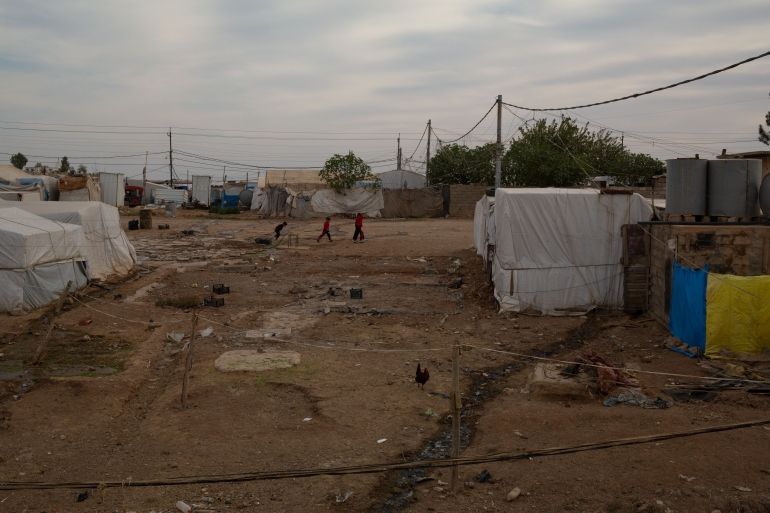 Women from the Khanke camp for internally displaced people attend weekly
psychotherapy sessions at the nearby Harman Community Centre
Women from the Khanke camp for internally displaced people attend weekly
psychotherapy sessions at the nearby Harman Community Centre
Back in his village, ISIL came to his home, says Ahmad, pausing to rub at his broad moustache, tension building in his forehead. He, like others in his extended family, gave in to pressure to convert to Islam. It was that or face death, he says. He also passed up a second chance for him and his family to leave with smugglers, fearing they were ISIL members trying to trick him.
“I was confused, paranoid, worried,” he says, wringing his hands. “I felt eyes all on me always. I didn’t trust anyone.” His voice grows louder and more exasperated and his arm seizes up again.
Remembering his psychotherapist’s tip, he pauses to take deep breaths and stretches his arms and legs. Then he returns to his story, skipping to the end.
Eventually, two years later in 2016, they found a way to escape with smugglers that he trusted, making it to safety in Duhok, nearly two hours away, but the pressure of being unable to support his family of six and life at the camp weighs heavily on him. “These burdens are still inside of me,” he says quietly.
After a few minutes of silence, the psychotherapist asks what he is feeling now. He explains that he is thinking about the relief he felt when he and his family finally made it to Duhok, but how it took him time to feel safe.
He worries about his five-year-old daughter with a disability who they left behind with other family members. She could not make the journey without medical support. He was going to go back for her. After arriving in Duhok, Ahmad learned of the deaths of the family members caring for her. “Maybe, she is in captivity now,” he whispers, looking down at his clasped hands.
He desperately wants to go back to look for her but doesn’t know where she is, if she is still alive, and fears Sinjar is still not safe.
“If I go back, who will help us there? Here, I have Dr Rawnaq,” he says. “And we can make a plan together.”
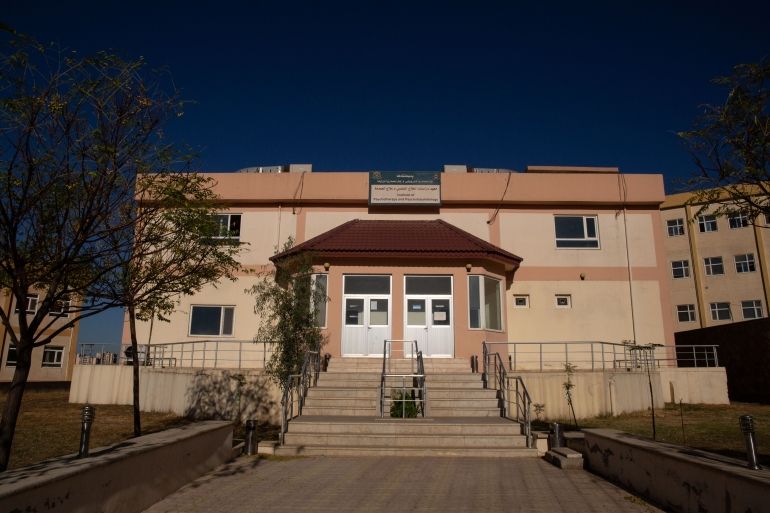 The Institute of Psychotherapy and Psycho-traumatology (IPP) is nestled
atop a hill inside the University of Duhok in the Kurdish region of
northern Iraq
The Institute of Psychotherapy and Psycho-traumatology (IPP) is nestled
atop a hill inside the University of Duhok in the Kurdish region of
northern Iraq
Duhok’s German clinic
The hundreds of thousands of Yazidis in the displacement camps around Duhok suffer the pain left behind by sexual abuse, loss, torture, abduction and multigenerational persecution. Many suffer from PTSD and more than 12 suicides were reported in the first three weeks of 2021 alone.
Ahmad receives counselling at the Institute of Psychotherapy and Psycho-traumatology (IPP) German Clinic for Psychotherapy, a one-storey building in the centre of Duhok.
The IPP also has a professional training programme to prepare a new generation of local psychotherapists with the specialised trauma skills needed to treat Iraq’s mental health epidemic after years of war.
It is the brainchild of a German-Yazidi psychotherapist, Jan Kizilhan who, with financial help from the German state of Baden-Württemberg and the University of Tübingen, founded the centre in 2016. It’s the first initiative of its kind in the country.
So far, 58 students have graduated from the centre. Drawn from a pool of medical students, nurses and social workers, the students earn a master’s in psychotherapy that includes counselling, running a suicide hotline and doing outreach in the camps.
They are trying to build a culture of talk therapy in a country where most people have never spoken to a psychologist. An advantage they have is that IPP students and staff are specially trained in trauma and have an innate understanding of the culture.
“The whole society needs mental health support, so we are trying to first, build a new awareness to break the stigma and say ‘It’s ok, we all need mental health support,’” says Mamo Othman, the assistant dean of the IPP. “Then we need to train specialists to offer this support because it is our duty to serve our society.”
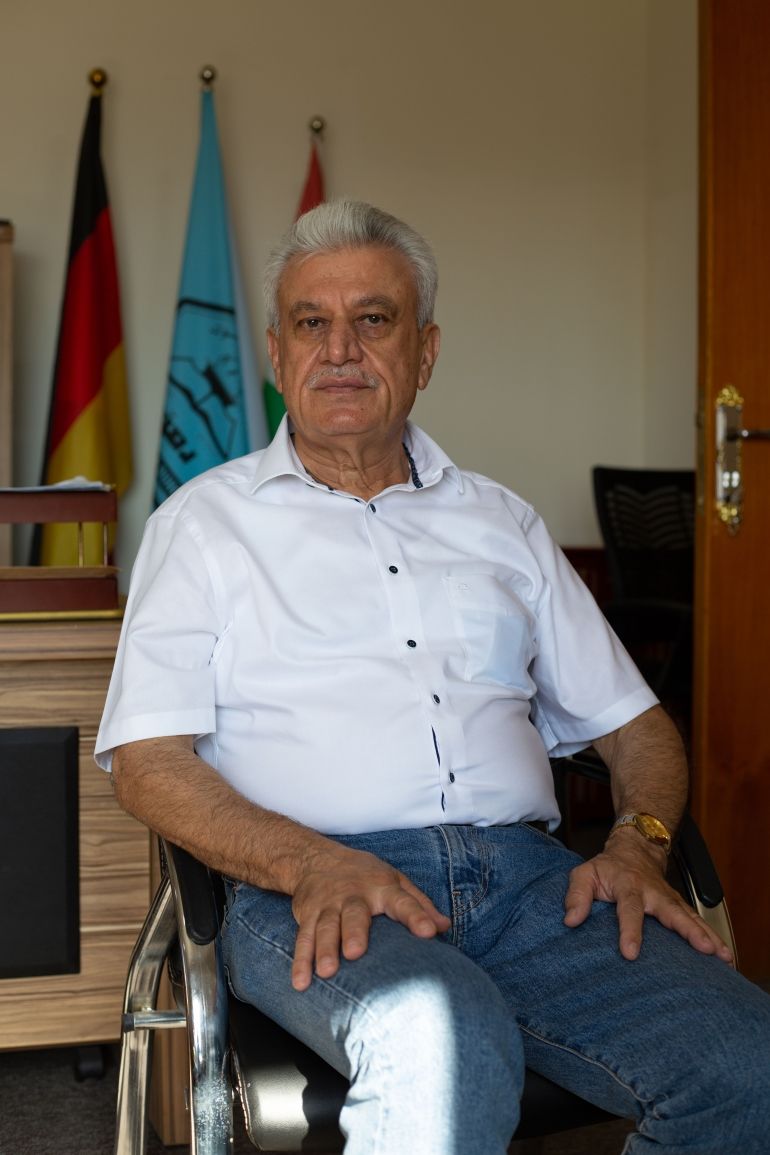 Mamo Othman, the assistant dean of the IPP, which is training local
psychotherapists to treat Iraq’s mental health epidemic after years of
war and trauma
Mamo Othman, the assistant dean of the IPP, which is training local
psychotherapists to treat Iraq’s mental health epidemic after years of
war and trauma
The need is immense. In the Kurdish region of northern Iraq, where it was estimated in 2017 that more than one million people had been displaced by violence, only a few dozen local psychologists are treating patients.
Today, a handful of international NGOs offer mental health support to people in the camps, but since they can only handle a limited caseload they refer many cases to the IPP, says 30-year-old Shaima Namiq, a graduating student who has worked with 200 patients over the past three years.
Namiq says the psychosocial support NGOs offer is not suited to the severity and breadth of the issues in the camps, especially care for female victims of sexual violence, for whom the impact of the trauma “has now grown greater than some parts of the actual event”.
“There are so many different wars in Iraq. It’s hard to know where the real trauma begins,” she says.
No psychotherapists are based within the Duhok camps, and most of the displaced people cannot afford the hour’s drive to the city centre. Students visit the camps as part of their minimum 1,200 hours of internship and the hotline helps identify those who need urgent care.
The stigma around mental health is a tough obstacle. “People think if someone goes to the clinic for psychotherapy, they are crazy, especially if it’s a woman,” Namiq says. But word is slowly getting out and more and more people are reaching out after hearing good reports from others in the community.
Accessing blocked emotions
At the Harman Community Centre near the Khanke IDP camp, colourful murals show butterflies and children playing together under blossoming trees.
Two IPP therapists, Prishang Omer Ahmed and Iran Abduljabar, sit at the end of a table in a quiet classroom with seven Yazidi women from a nearby camp. It’s time for their weekly psychotherapy session.
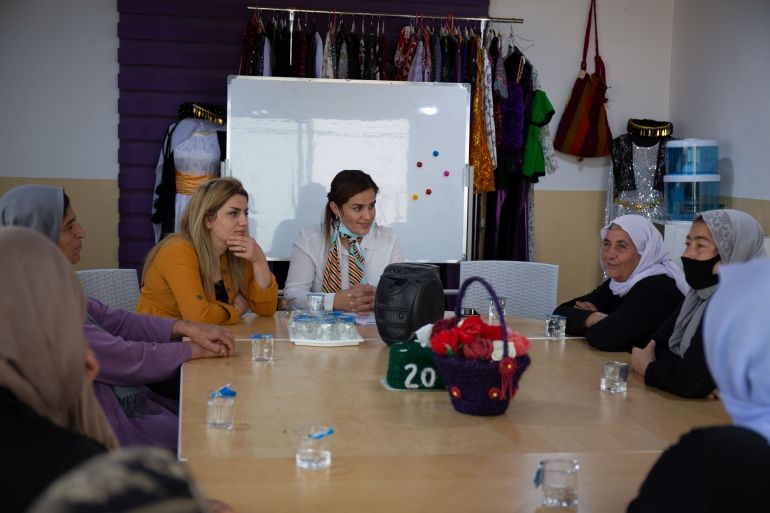 At the Harman Community Centre, Yazidi women attend a weekly
psychotherapy session with Prishang Omer Ahmed and Iran Abduljabar,
psychotherapists from the IPP programme
At the Harman Community Centre, Yazidi women attend a weekly
psychotherapy session with Prishang Omer Ahmed and Iran Abduljabar,
psychotherapists from the IPP programme
The seven Yazidi women are from Sinjar. Some fled as ISIL advanced. Others were held captive by ISIL but managed to escape, Ahmed explains. All are still looking for husbands and children who were kidnapped by ISIL.
“They don’t know anything about them, and this is very stressful,” Ahmed, who was born in Iran and grew up in Erbil in northern Iraq, says. “It has blocked them from moving forward so we established this group session to help them find ways to heal.”
The IPP psychotherapists use an array of methods to help people to address their trauma such as cognitive behavioural therapy, imagery rescripting and a method known as NET, or narrative exposure therapy, which is commonly used with communities that have experienced political or ethnic violence. They help the women address traumatic events by putting them in the wider context of their lives and coming up with an autobiography that weaves in positive experiences as well.
“People try to avoid their bad memories but by avoiding it, it never gets processed, so we open up the box, we take out the memories and we put them back in a more ordered and calm way,” says Terry Porsild, a Canadian psychologist who runs the IPP clinic since it opened in March 2021. She leads the clinic’s seven psychotherapists, who have all graduated from the IPP programme.
The patients are also taught relaxation techniques and to try to live more in the moment. The session begins with music and the women are asked to close their eyes and relax.
“It is like sitting under a tree and listening to the sounds of the birds,” says one of the women, Layle, who knits while she talks.
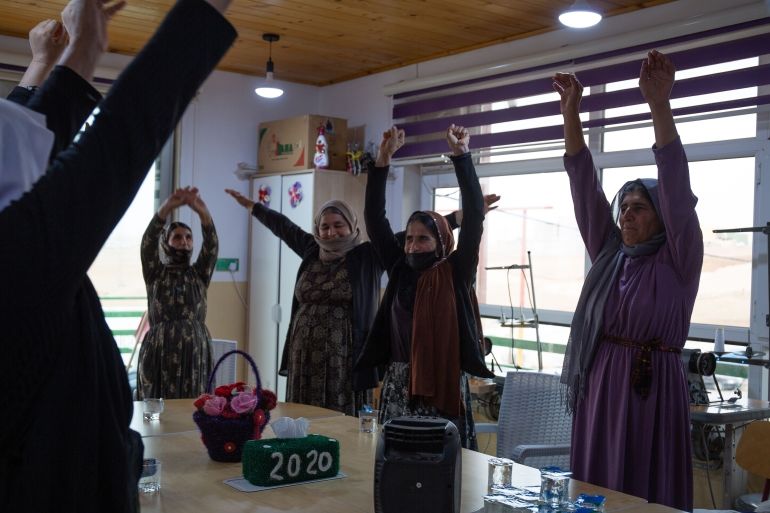 Yazidi women attend a therapy session that includes music and relaxation
techniques, as well as an energiser where they are encouraged to
stretch and physically loosen their bodies
Yazidi women attend a therapy session that includes music and relaxation
techniques, as well as an energiser where they are encouraged to
stretch and physically loosen their bodies
After the relaxation comes the energiser, where the women are encouraged to stretch and loosen their bodies.
Then everybody settles down and Ahmed encourages them to talk about how to change nightmares and negative imagery and thoughts into positive ones.
“All of us are thinking negatively because our husband and children are still in ISIL captivity, so we are all thinking about what happened to them. We lie awake thinking about them,” says Layle. “But we have been practising controlling these thoughts.”
Ahmed and Abduljabar draw a picture of a table on the whiteboard. Next to the table’s legs, they write down the things that the women say keep them strong after the horrors they have seen.
The women call out words: strength, patience, perseverance, their children, and so on. On top of the table, the psychotherapists write the negatives; homelessness, ISIL, no support in the camps, children still in captivity, and an unstable economic state. These are the things that the women have to discuss and tackle, and it will not be a short journey.
After the session, Ahmed takes a seat at the table again, adjusting her striped neck scarf as she leans forward.
“People in my community, and Yazidi women, in particular, have suffered so much and they needed professionals to understand them and support them to recover, so I wanted to be this person,” she tells Al Jazeera.
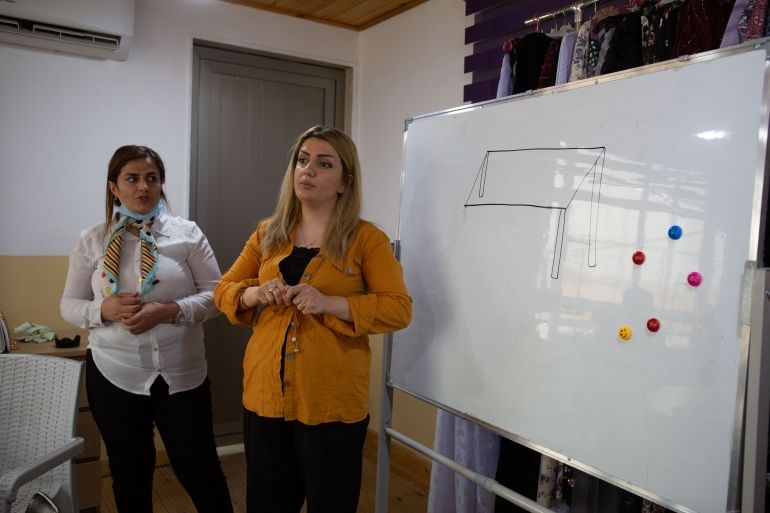 Psychotherapists Prishang Omer Ahmed and Iran Abduljabar run a session with Yazidi women
Psychotherapists Prishang Omer Ahmed and Iran Abduljabar run a session with Yazidi women
Ahmed had been studying social work while looking into treatments that would work for Yazidi women survivors when she heard about the IPP programme and thought it may be the answer.
The first case she worked on convinced her that the therapy worked. Her patient was a 46-year-old Yazidi woman who had been abducted along with her family and held and tortured by ISIL for two years.
The woman managed to escape with three of her children, but her husband and other children were still in captivity. “She was very depressed all day thinking about her children, what happened to them, how they are doing,” explains Ahmed.
Her PTSD symptoms decreased with therapy. “She was able to cope and accept what happened and accept that her children may be alive or dead,” says Ahmed.
Today, Layle believes strongly that her son is still alive, and she will be returning to Sinjar soon, hoping to reunite with him. Two other women from the therapy group have returned since August last year, joining thousands who have made that trip.
Ahmed stresses that these returnees would need continued, consistent care: “In their return, they need to feel supported, continuing therapy would strengthen their ability to cope.”
A flower and a stone
One of Namiq’s cases in the camps is a 28-year-old woman suffering from PTSD. She has severe insomnia and often fainted during therapy sessions.
In 2014, ISIL abducted the woman and three others, and sexually abused them for three days. She escaped to the Kurdish region but still experiences nightmares and flashbacks.
“She thinks she is in the same situation as 2014 and that ISIS is still around her in that room,” Namiq says.
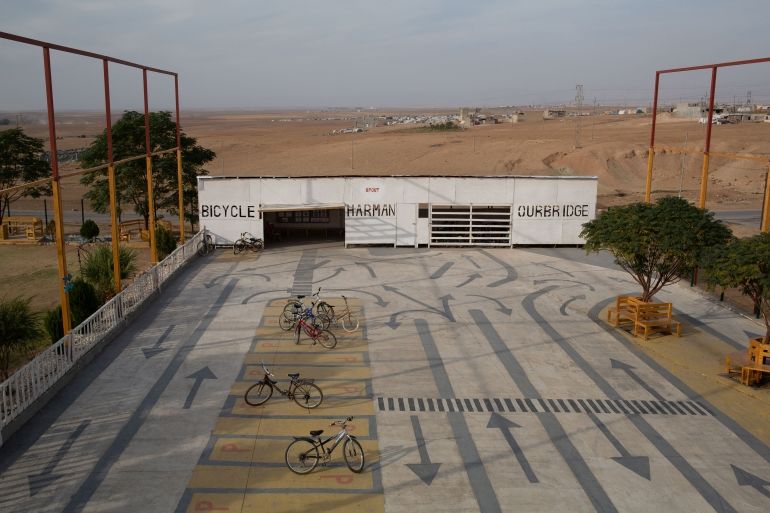 The Harman Community Centre
The Harman Community Centre
Namiq established a lifeline with her through NET. Together they put a flower on the happy memories in her life and a stone on the bad ones.
“This is in the first session. And then, stone by stone, flower by flower, you are talking about the events in detail in a safe place and then connecting this experience to now,” says Namiq.
After 43 sessions, the woman is now describing her nightmares in less detail. “When she used to talk about the past, her body was struggling a lot and she could not control her crying. Now, she can talk calmly and her fainting has stopped,” says Namiq.
But Namiq worries that if the woman returns to Sinjar too soon, her bad memories will flood back, especially if she does not have continued support. “It’s a long-term process to treat the layers,” she says.
Trauma is passed down through the generations
Speaking to Al Jazeera, Kizilhan says his own background as a refugee from a family with an intergenerational history of persecution was part of the reason he was drawn to trauma counselling.
Noting that his people, the Yazidis, have experienced more than 70 massacres during the last 800 years, he describes how he began researching transgenerational trauma in repeatedly persecuted communities after studying medicine and psychology and earning his PhD.
“These traumas are passed on from one generation to the next culturally, psychologically and biologically,” he says. “Only when we understand the historical traumas can we better treat the survivors of terror, war and genocide.”
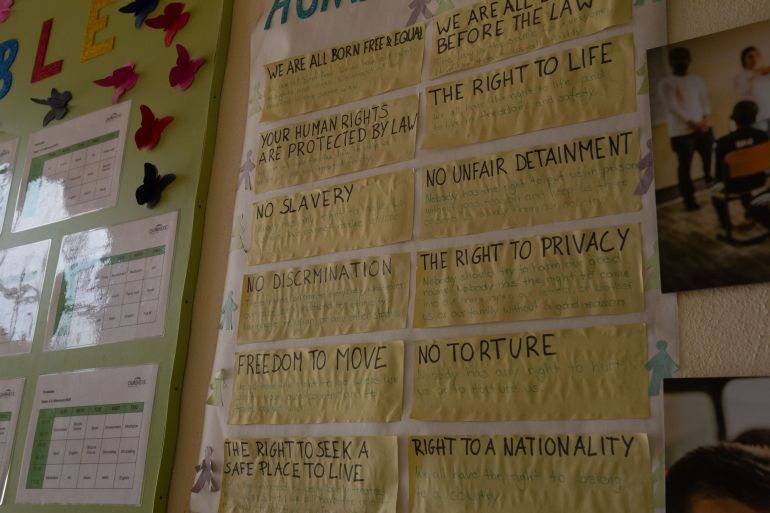 A poster on a wall at the Harman Community Centre, where psychotherapists work
A poster on a wall at the Harman Community Centre, where psychotherapists work
Kizilhan runs a department in a clinic in the city of Donaueschingen, Germany, that treats refugees from Afghanistan, Iran, Iraq, Syria and other countries. He also trains UN staff and police officers and advises governments and institutions in this field.
He was invited to join an effort to bring 1,100 Yazidi women and children who were traumatised by ISIL to Germany for treatment in 2015. While this was important work, he realised it would be more effective to treat people on site.
“It was clear to me that we can only help if we have experts on the ground who can help in the language of the survivors and on the background of their culture in the long term,” he says. “Only in this way can a society cope with the trauma … and live in peace.”
Looking ahead
The IPP is training some of the students to take the reins of the institution – and even replicate its model in other cities in the Kurdish region and southern Iraq.
“Our aim is simple; to get more psychotherapists working in the community across Iraq,” says Othman, the assistant dean. He fled Iraq at the beginning of the Iraq-Iran war in 1980 and returned to the Kurdish region in 2004 after realising the region was in desperate need of mental health support.
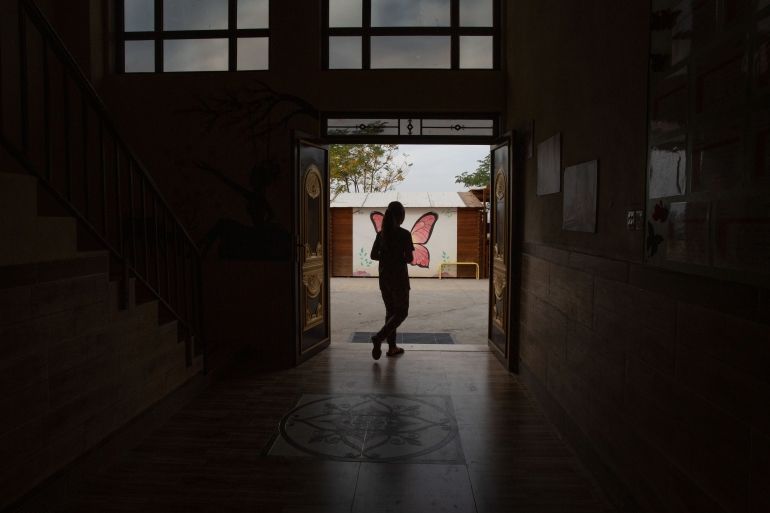 A Yazidi woman attends a psychotherapy session
A Yazidi woman attends a psychotherapy session
While there is a long road ahead to build a force of specialists large enough to address the larger mental health crisis in Iraq, Othman sees great potential. Most of their graduates are female, and he says women have a key advantage in specialised trauma therapy in Iraq.
“Women want to speak to women. And most of the time, men also want to speak to women, because they are ashamed or embarrassed by their emotions. Something they feel they cannot share with a male psychotherapist.”
Sinjar lacks essential mental health services. However, the IPP hopes to extend its programme to support the returning Yazidi community there in July. A handful of IPP students will make the two-hour trip twice a week to continue treatment for returnees.
At the Sinjar hospital, the international emergency relief group Cordaid ran a Mental Health and Psychosocial Support (MHPSS) programme with one social worker and one psychiatrist, Dr Muzahim Mohammad Aboosh.
In October 2021, Dr Aboosh said the clinic saw up to 50 patients a week, mostly women and a handful of children.
“Sinjar is slowly stabilising, but it is still not safe,” he said at the time. “It is an environment that is full of negative memories for Yazidis returning home and we are treating multiple layers of mental health problems.”
The clinic shut in December when Coraid’s programme came to a close but Dr Aboosh continues his work as a psychiatrist in Nineveh. He is not only treating trauma from conflict and displacement but also that which flares when Yazidis return to the place where the ordeal began.











